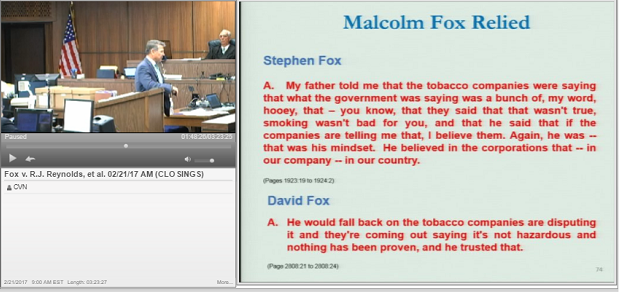
Steven Hammer delivers his closing argument at trial against R.J. Reynolds for the company's role in the heart and respiratory disease Blanche Fox claims her husband, Malcom, suffered after decades of smoking.
Fort Lauderdale, FL--A Florida state court jury handed down a $6 million verdict against R.J. Reynolds for the role jurors found the tobacco giant played in the illness a decorated World War II veteran developed after smoking cigarettes for more than a half century. Fox v. R.J. Reynolds, 2008-CV-026348.
The six-member, 17th Circuit Court jury concluded the Reynolds cigarettes Malcom Fox smoked for decades helped cause his nicotine addiction and led to his heart or respiratory disease. However, jurors found smoking did not cause Fox’s death at 82 and they declined to award punitive damages in the case after clearing Reynolds of responsibility on his widow Blanche’s fraud and conspiracy claims.
Thursday’s award equaled the amount in compensatories Blanche Fox’s attorney, Steven Hammer, of Schlesinger Law Offices, P.A., requested. However, the award will likely be halved based on the jury’s determination that Fox was 50% responsible for his illness.
Fox, who was awarded the Distinguished Flying Cross while serving in World War II, died after smoking more than a pack of cigarettes a day for much of his life. His widow, Blanche, claims Reynolds’ participation in a sweeping conspiracy to hide the dangers of smoking through much of the last century caused her husband to become hooked on cigarettes and led him to develop heart and respiratory disease.
The Fox case is one of thousands of Engle progeny cases in Florida, which stem from a 2006 Florida Supreme Court decision decertifying Engle v. Liggett Group Inc., a class-action tobacco suit originally filed in 1994. Although the state’s supreme court ruled that so-called Engle-progeny cases must be tried individually, it found plaintiffs could rely on certain jury findings in the original case, including the determination that tobacco companies had placed a dangerous, addictive product on the market and had conspired to hide the dangers of smoking. However, individual Engle-progeny plaintiffs must prove a variety of elements to establish class membership, including nicotine addiction and a causal link between that addiction and specific health problems such as chronic obstructive pulmonary disease, or COPD.
The 11-day trial revolved around whether Fox was addicted to nicotine and whether he was responsible for his illness. During Wednesday’s closing arguments, Jones Day’s Mark Belasic told jurors Fox’s widow believed he was never truly interested in quitting smoking until it was too late to avoid any damage cigarettes caused. “There’s no doubt in this case that the woman who knows him best, the woman who lived with him for 60 years, the woman who saw him every day, the woman who wants $6 million, said he was capable of quitting,” Belasic said.
However, Hammer reminded jurors of Fox’s failed quit attempts as well as expert testimony concluding Fox was a nicotine addict. He also said Fox’s widow had merely bought into a tobacco company message meant to shift blame to smokers. “Blanche Fox told you ‘Yeah, but if he really wanted to quit he could have quit,’” Hammer said. “Well, that’s the message tobacco companies gave everybody.”
Email Arlin Crisco at acrisco@cvn.com.
Related Information
Blanche Fox is represented by Steven Hammer, Jonathan Gdanski, and Brittany Chambers, of Schlesinger Law Offices, P.A.
R.J. Reynolds is represented by Jones Day’s Mark Belasic and Dennis Murphy.
Not a subscriber?
Learn more about CVN's unrivaled tobacco litigation library.





